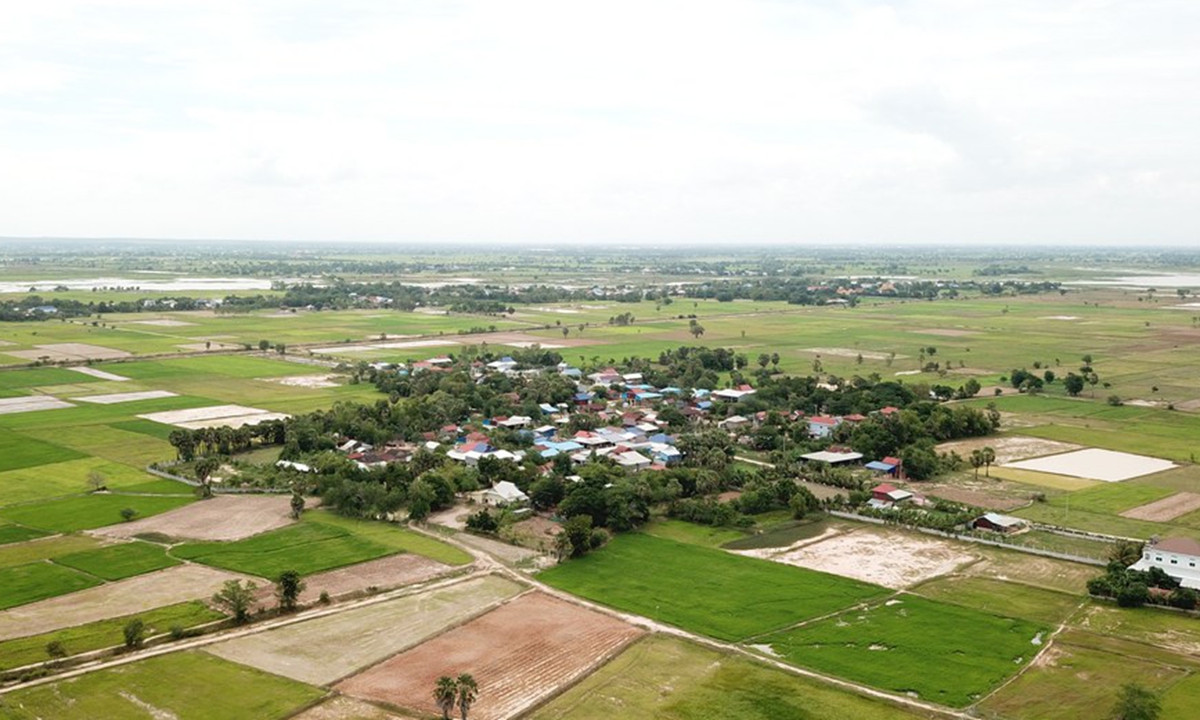
This aerial photo taken on Sept. 14, 2023 shows Tanorn village in Bati district of Takeo province, Cambodia. (Photo by Van Pov/Xinhua)
Launched in January 2021, the nearly-completed Cambodia-China Friendship Village for Poverty Alleviation Project has brought great changes to the remotely poor Tanorn village here, lifting residents out of poverty and improving the education environment for their children.
Situated in Takeo province's Bati district, roughly 60 km south of the country's capital Phnom Penh, the tiny Tanorn village, with a total area of 72 hectares, is home to 127 households with 615 people.
Tanorn village chief Pang Samedy said the village was once isolated due to poor access roads, with no clean water, electricity, school, and health center, but the situation completely changed after the China Foundation for Peace and Development (CFPD) funded the poverty alleviation project in the village.
"Now, residents can grow paddy rice twice per year, with proper access roads, and they have access to solar power and clean water, and some have received funds for raising chicken and ducks, or growing vegetables," he told Xinhua on Thursday.
"The project has improved living standards for the villagers from zero to a moderate level," he said.
Samedy said residents in Tanorn village are happily enjoying the fruits of the China-funded development project.
"I would like to express my profound thanks to China for helping develop Tanorn village, turning this poor village into a moderately prosperous village," he said.
Pech Navy, a 43-year-old villager, said the project has changed her family's lives -- she has now been able to travel to work at a garment factory and her children can go to school after the project has built a concrete road connecting the village to the outside world.
"Previously, it was quite difficult to travel from the village to the capital Phnom Penh, or to work at a garment factory because of poor access roads," she told Xinhua.
Working at the garment factory, Navy can earn about 250 US dollars per month.
It was even more difficult for villagers to sell paddy rice or pigs because brokers did not come to buy them due to poor road conditions, she added.
"Now, the project has provided concrete roads, solar power, and clean water. Our livelihoods are better than before because, with good roads, we can travel to work at the garment factory and return home easily, so we can meet our children every day," the mother of three children said.
The project has also built a two-story concrete building with 12 classrooms for the Angkomnob Primary School in a Bati district, which has greatly benefited children in Tanorn village.
Navy's 13-year-old daughter Sal Samnang, a sixth-grader of the school, said the project has also provided school supplies to all students of the school.
"I have received gifts from the Chinese project, including a bicycle, a bag, a water bottle, a lunch box, pens, pencils, and erasers as well as other materials," she told Xinhua.
"I would like to thank China for constructing this school building for us and having brought better development to my village," she added.
